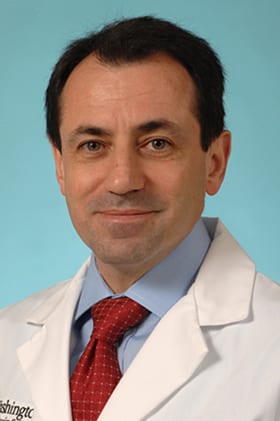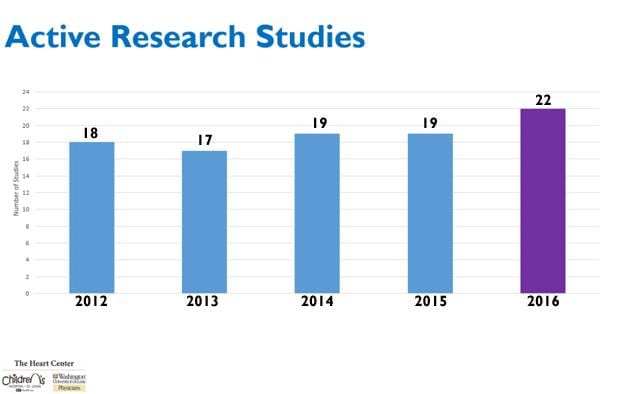
Our research mission is to understand the cause of congenital heart disease and to implement changes to improve outcomes.
The research of Pirooz Eghtesady, MD, PhD, is on understanding the pathogenesis of congenital heart diseases, with particular emphasis of ventricle septal defects, hypoplastic left heart syndrome (HLHS) and aortic stenosis. Research includes clinical and laboratory studies to determine the cause of these defects. At the same time, translational studies using animal models are under way with the goal of developing clinically applicable protocols for fetal cardiac intervention and surgery, and to better understand the mechanisms underlying in utero evolution of congenital heart defects, as well the significance of maternal reproductive history on babies developing heart problems.
The lab performs analyses on biological samples collected from clinical research volunteers. Additionally, the lab is working to produce animal models that recapitulate human congenital heart disease. Cell culture, tissue sectioning, laser capture microdissection and various molecular biology techniques (e.g., ELISA, Western’s, RT-PCR, qPCR) are some of the methods used to study both the clinical and animal model samples.
More recently, we have explored innovative solutions for some very difficult problems. such as increasing lung donation rates and improving surgical outcomes by using technological advances to improve surgical techniques in the operating room; enhancing surgical planning; and better managing symptoms at home.
IRB-approved clinical protocols
Pirooz Eghtesady
This study will evaluate the effects of certain viruses and their roles in babies having congenital heart defects (CHDs) in general as well as to better understand mechanisms leading to the development of HLHS. Environmental, reproductive and viral history are investigated to better understand CHD causes and mechanisms. We are currently enrolling pregnant woman and their babies. We are gathering health history data and collecting specimens, and analysis is under way to find a potential link to/causes of CHD.
Our long-term goal is to develop a machine that can detect and recognize underlying cardiac anatomy and actually tell us what we need to do to fix the lesion. In this project, we seek to leverage the power of computer vision and machine learning to convert 2D ultrasound images into 3D echocardiographic data (that is, 3D heart models) for patients with CHD. This innovation will open up research avenues using safe and cheap 3D echocardiographic data, and provide novel treatment options for many other diseases. We hope this approach will help us identify best practices and clinical judgment in order to best care for our patients with CHD. Our ultimate goal is to enhance health care delivery in all phases.
Pirooz Eghtesady, MD, PhD, and Peter Manning, MD

The Congenital Heart Surgeons Society’s goal is to improve care for patients with CHD through collaborative research. The project encourages and stimulates investigation that will increase the knowledge of congenital cardiac physiology, pathology and therapy, and correlates and disseminates such knowledge. The data center is a research engine that extracts knowledge from the collective clinical experience of the membership. Currently, there is active enrollment of CHD kids with the following diagnoses: AAOCA (anomalous aortic origin of a coronary artery), left ventricular outflow tract obstruction (LVOTO), tricuspid atresia (TA), and atrioventricular septal defects (AVSD). Member surgeons are currently consenting, collecting and sharing clinical data, images and echoes/MRIs (reports and actual images on CDs) on a quarterly basis. Long-term follow-up is still under way for several other CHDs.
Large (60 hospitals) collaborative that focuses on HLHS patients’ inter-stage and long-term outcomes. Cardiology and cardiothoracic surgery multidisciplinary study.
Upcoming clinical trials/protocols (in development phase)
- Epharmix: An electronic intervention featuring SMS text messages and phone calls that may improve clinical outcomes.
- PumpKIn trial: Randomized multi-site clinical trial using a continuous flow device called the Jarvik2015. This is a ventricular assist device (VAD) used in children with heart failure.
- Industry-sponsored research study: Infusion of IV citrulline during heart surgery to a subset of CHD patients to reduce lung injury.
- Ex-Vivo Lung Perfusion (EVLP) for Pediatric Lung Transplantation: EVLP has been a successful approach to preserve, assess and potentially repair donor lungs in adult transplantation and may help combat the donor shortage for pediatric transplant candidates. The use of EVLP in children and adolescents also has the potential to improve quality and results of pediatric lung transplantation.
Grants
- Saint Louis Children’s Hospital Foundation
- Children’s Surgical Sciences Research Institute
The impact of the program is to establish our pediatric surgical services as the forefront academic program in the country. The expected outcomes will be leading-edge translational research to improve the care of children with surgical diseases and creation of a synergistic environment for discovery and career development for surgical scientists.
Grants since 2012
| Year | Title | Organization | Total Costs | Description |
| 06/01/11-5/31/12 | Mechanisms in the Pathogenesis of HLHS | Saving Tiny Hearts Society | $65,066 | To determine if maternal autoantibodies against the heart, transferred to the developing fetus, may play a role in the pathogenesis of congenital heart disease. The data showed that. |
| 7-25/11-5/31/13 | Developing an animal model of HLHS: role of immune mediate injury | NIH R21 HL104391 | $226,880 | To develop an animal model based on our clinical data that maternal antibodies against cardiac myosin contribute to a phenotype characteristic of hypoplastic left heart syndrome. Our studies showed that increased left ventricular myocardial thickness and left ventricular cavity hypoplasia developed in offspring from pregnant rats immunized with cardiac myosin. |
| 1/12/10-12/31/14 | Hypoplastic Left Heart Syndrome: Rheumatic Heart Disease of the Fetus? | NIH R01 HL098634 | $1,879,980 | To determine if mothers of babies with HLHS have elevated antibodies that react with valvular and myocardial antigens, and to determine if heart reactive antibodies are present in myocardial tissue obtained from HLHS babies obtained at the time of surgical intervention. |
| 3/1/10-2/28/14 | HLHS: Rheumatic Heart Disease | Children’s Heart Association | $250,000 | To determine potential mechanisms in the pathogenesis of HLHS through analysis of serum samples from pregnant women with babies affected by HLHS and development of a rodent model of HLHS. |
| 9/1/13-8/31/14 | Machine Learning of Best Practice Patterns in Pediatric Cardiac Surgery: A Proof of Concept Study | University Research Strategic Alliance Washington University, St. Louis | $25,000 | |
| 9/1/13-8/31/14 | Clinical Sample Repository Collection | Washington University Institute of Clinical and Translational Sciences | $4,875 | To collect cord blood from babies with HLHS, other CHD or healthy controls. |
| 4/1/13-3/31/16 | Institute of Clinical & Translational Sciences | $50,000 | Our goal is to develop quality improvement (QI) initiatives to identify best practice patterns and eliminate “failures” within the pediatric cardiac surgery operating room. | |
| 7/1/08-6/20/17 | St. Louis Children’s Hospital Foundation | $300,000 | The impact of the program is to establish our pediatric surgical services at the forefront of academic programs in the country. The expected outcomes will be cutting edge translational research to improve the care of children with surgical diseases and create a synergistic environment for discovery and career development for surgical scientist. |
Clinical projects & active protocols
IRB approved protocols in analysis/publication phase
- Worldwide experience with pediatric Heartware implants
- The concentration of vancomycin in cardiothoracic surgical tissue
- Evaluation of maternal ß-hemolytic streptococcal (strep) pharyngeal exposure in pregnancy
Current clinical projects
- Airway complications in pediatric lung transplantation
- 3D echocardiography from 2D ultrasound images
- Melody valve in the native RVOT
- Lung transplantation in CF population
- XVIVO HUD
- LVAD implantation in patients with muscular dystrophy
- Heart transplantation with chromosomal anomalies
- Improved waitlist and transplant outcomes for pediatric lung transplantation after implementation of the lung allocation score
- Analysis of outcomes of lung transplantation for children with surfactant deficiencies
- Analysis of the effect of pre-transplant ECMO use on pediatric lung transplant outcomes
- Aspirin
- BTS vs. catheter vs. other
- Prostaglandin
- Chromosomal anomalies vs. patients without abnormalities
- Coarctation PHIS study
- Abstract on DMD
- Age- and sex-related outcomes of the Ross Procedure: An institutional report
- IVH among newborns with CHD

